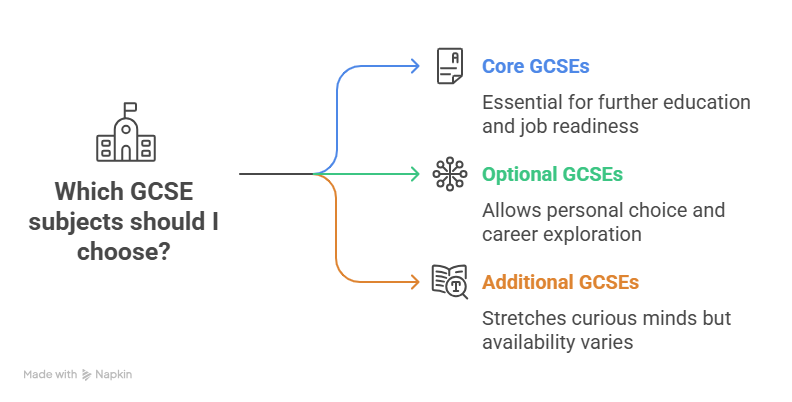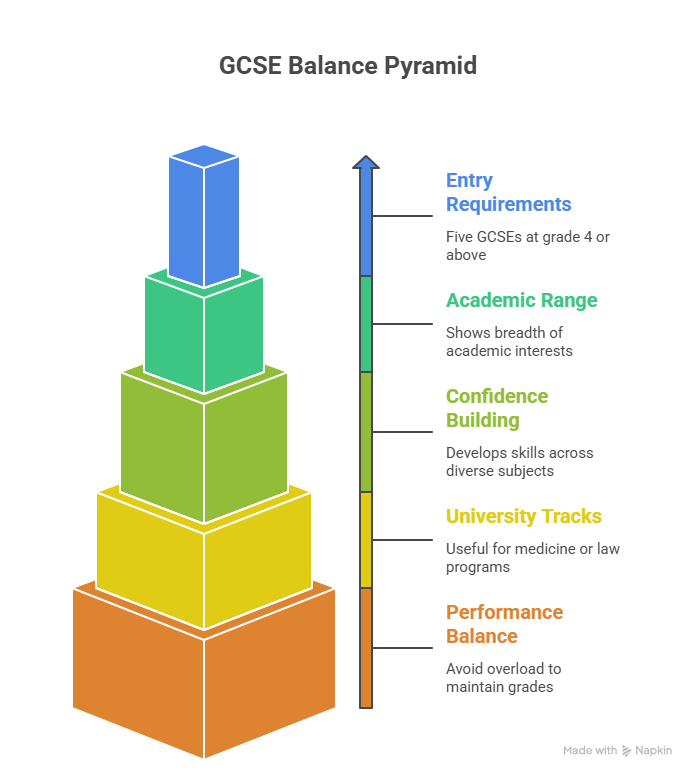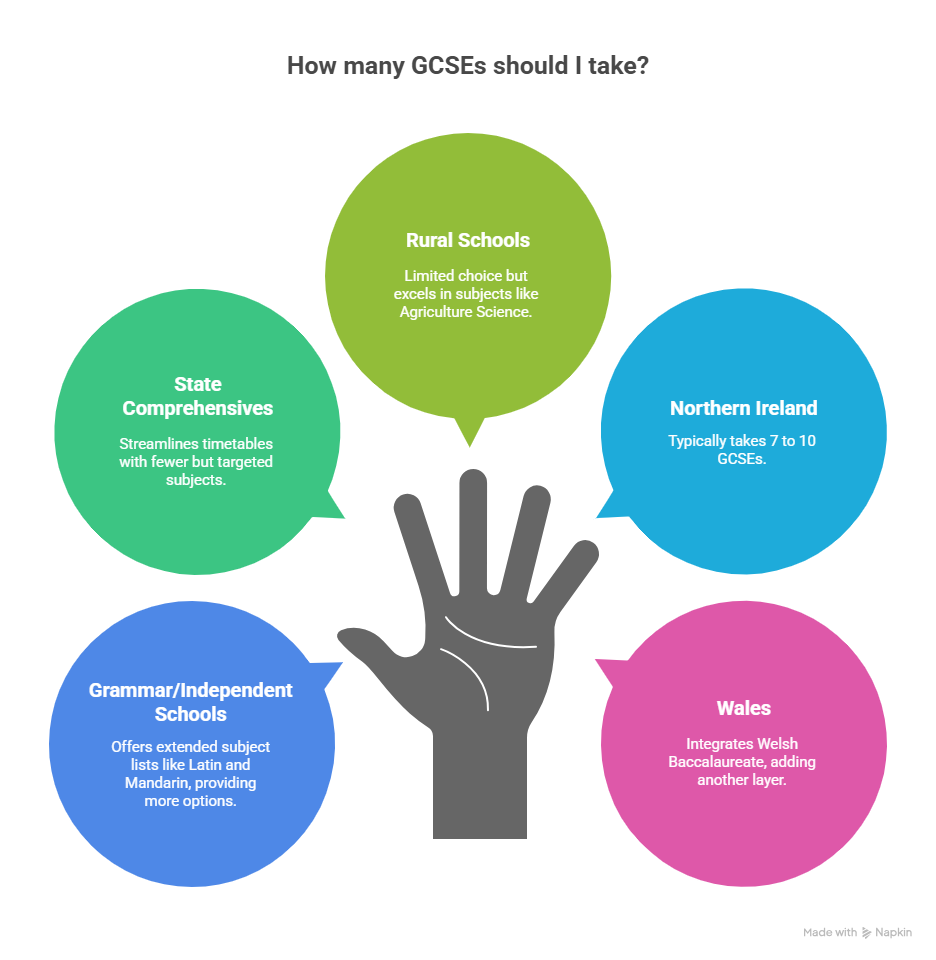How Many GCSEs Do You Take in 2025? The Complete Student & Parent Guide
Ever wondered how many GCSEs students take in 2025? The answer might surprise you. According to Ofqual’s 2025 GCSE entry data, the average UK student sits for eight to nine GCSEs, striking a balance between academic depth and workload. Schools across England and Wales continue to prioritise core GCSE subjects like English, Maths, and Science, while offering flexible optional GCSEs such as Business Studies, Art, or Computer Science.
Historical Norms and Trends
But the real story isn’t just the number — it’s why students are taking slightly fewer exams than in past years. With a growing focus on well-being, tailored subject combinations, and results that reflect true capability, 2025 marks a shift toward smarter GCSE choices rather than more of them. Let’s unpack what’s shaping this trend and what it means for students planning their exams this year.
For decades, GCSEs have been the heartbeat of secondary education in the UK — the stepping stones that bridge classroom learning to A-levels, apprenticeships, or college life. Back in the early 2000s, most students took around 8 to 10 GCSEs, and that hasn’t changed drastically. What has shifted, however, is how those subjects are structured, graded, and valued.
In 2017, the old A*–G grading system gave way to the 9–1 scale, reshaping how performance is reported. This change, introduced by Ofqual, made it easier to differentiate top achievers and ensure consistency across exam boards like AQA, Edexcel, OCR, and WJEC.
By the early 2020s, data from the Joint Council for Qualifications (JCQ) showed that students typically sat eight to nine GCSEs, with English, Maths, and Science forming the foundation. This remains the national average in 2025. Yet, beyond the numbers, there’s been a gradual evolution in subject preferences. For instance, Computer Science and Business Studies have surged in popularity, while some schools report a slow decline in modern foreign languages.
Why? Because education in 2025 leans toward practicality. Students — and their parents — are now thinking in terms of career relevance and post-16 pathways. Schools, too, encourage choices that align with future aspirations rather than simply racking up exam papers.
The 2025 Picture: How Many GCSEs Students Are Taking
So, how many GCSEs are students actually sitting for in 2025? According to the GOV.UK provisional entries report for 2025, most Year 11 students in England take between 8 and 10 subjects.
Nine remains the most common number — that “sweet spot” balancing breadth with manageability. Students at grammar or independent schools might stretch to 10 or 11 GCSEs, often adding subjects like Economics, Latin, or Art. In contrast, some schools streamline to 7 or 8 for a stronger focus on core performance.
Interestingly, the 2025 trend leans toward quality over quantity. The pressure to “collect” GCSEs has eased. Employers and sixth forms increasingly focus on grades (especially in English and Maths), rather than the sheer number of exams.
Core, Elective, and Optional Subjects

Every school has its rhythm, but the GCSE structure in 2025 generally falls into three tiers:
Let’s unpack that a bit.
Core GCSEs are non-negotiable — your foundation. Schools must offer them because they’re essential for further education or job readiness. Maths, English, and Science form the trio that every student faces, though Science may appear as either Combined Science (worth 2 GCSEs) or the more advanced Triple Science (Biology, Chemistry, Physics).
Then come the optional subjects. Here’s where choice — and personality — shine. Some gravitate to the humanities, others to the arts or business. Students planning careers in engineering might opt for Computer Science or Design Technology, while creative types might take Art & Design or Drama.
Finally, a few schools still offer additional GCSEs, like Psychology, Sociology, or Statistics, often taught in lunch-hour electives. These stretch curious minds — though not every school has the staff or hours to make them possible.
How Many GCSEs Should You Take in 2025? Expert Advice for Students & Parents

Eight or nine GCSEs are usually enough to meet college and A-level entry requirements. Most sixth forms ask for five GCSEs at grade 4 or above, including English and Maths. Top-tier academic programs may ask for seven or more, often with specific subject requirements.
There’s no perfect number, despite what friends or TikTok might tell you. The goal isn’t to out-collect your classmates — it’s to find your balance.
Pros of taking more GCSEs:
Shows academic range
Builds confidence across varied fields
Useful for university tracks like medicine or law
Cons of taking too many:
Overload can harm grades
Less time for revision depth
Higher stress during exam season
How GCSE Numbers Vary Across Regions and School Types

Not every school follows the same pattern. Regional and institutional factors shape the number of GCSEs available.
Grammar and independent schools often offer extended subject lists (Latin, Classical Civilisation, Mandarin).
State comprehensives may streamline timetables, offering fewer but more targeted subjects.
Rural schools sometimes have smaller staff teams, limiting choice — yet they often shine in subjects like Agriculture Science or Environmental Studies.
In Northern Ireland, students typically take 7 to 10 GCSEs, while in Wales, the Welsh Baccalaureate adds another layer to the mix. Some schools even integrate vocational awards, letting students combine GCSEs with BTECs or Cambridge Nationals, especially in technology or business.
This diversity reflects one thing: education flexibility. There’s no “one-size-fits-all.” A student at a small academy in Devon might take 7 GCSEs and excel just as much as a London student juggling 11.
The Future of GCSEs: What Could Change After 2025
Looking beyond 2025, GCSEs are quietly evolving. The debate over their future relevance continues — especially as digital learning and AI-driven assessment enter classrooms.
Education think tanks have proposed streamlining the system further, focusing on core literacy, numeracy, and digital competence rather than an exam-heavy structure. Pilot programs in a few London academies now test project-based assessments, where continuous coursework supplements final exams.
Subjects like Environmental Science and Data Analytics are predicted to rise, replacing older topics that no longer fit modern careers. At the same time, the English Baccalaureate (EBacc) framework remains strong, encouraging students to take traditional academic subjects (English, Maths, Science, History/Geography, and a language).
But even with reforms on the horizon, one constant endures: GCSEs still matter. They open doors — to colleges, apprenticeships, and universities. Whether you take seven or eleven, what truly counts is what you do with them.

